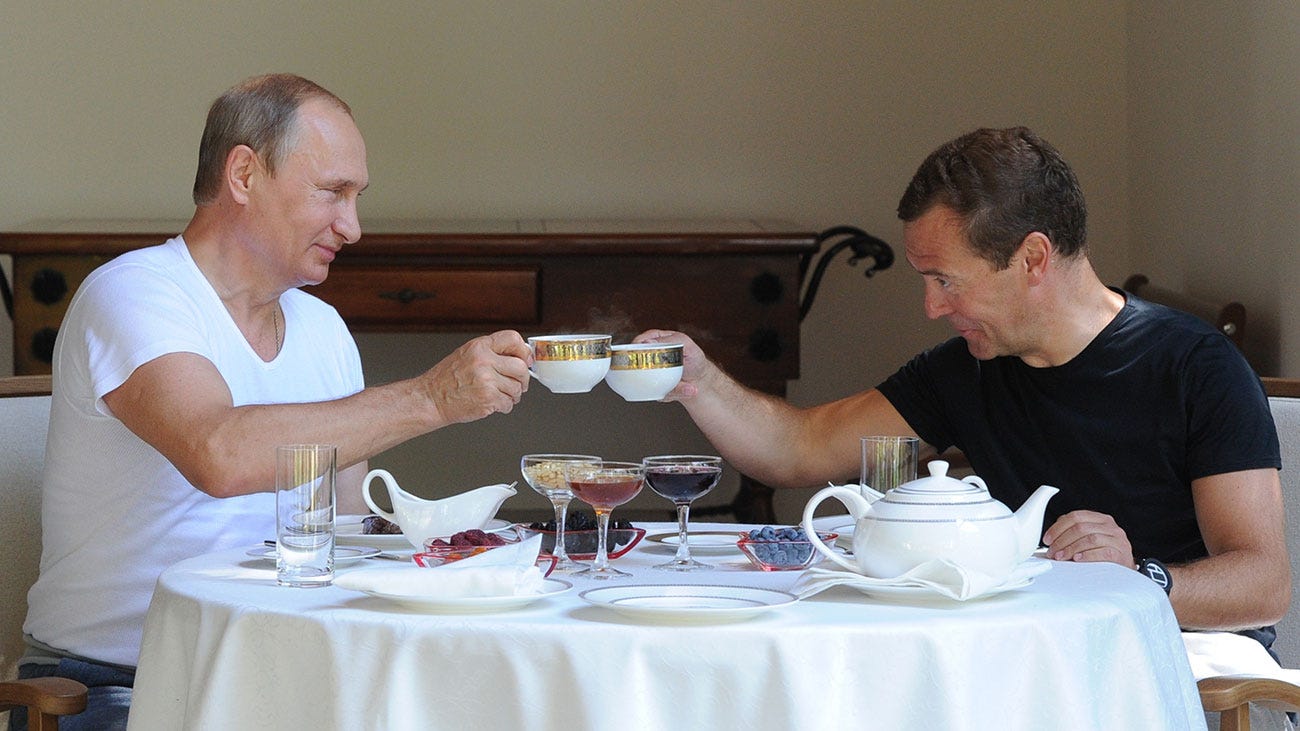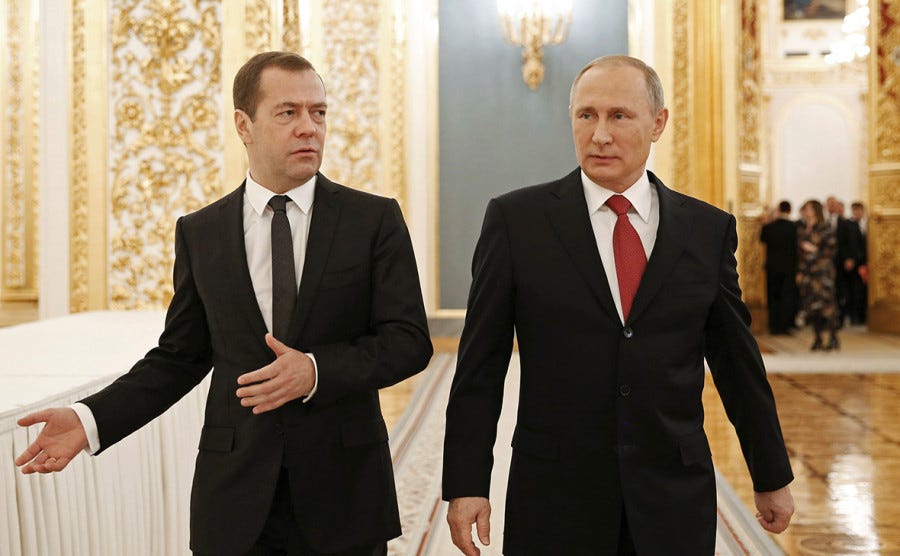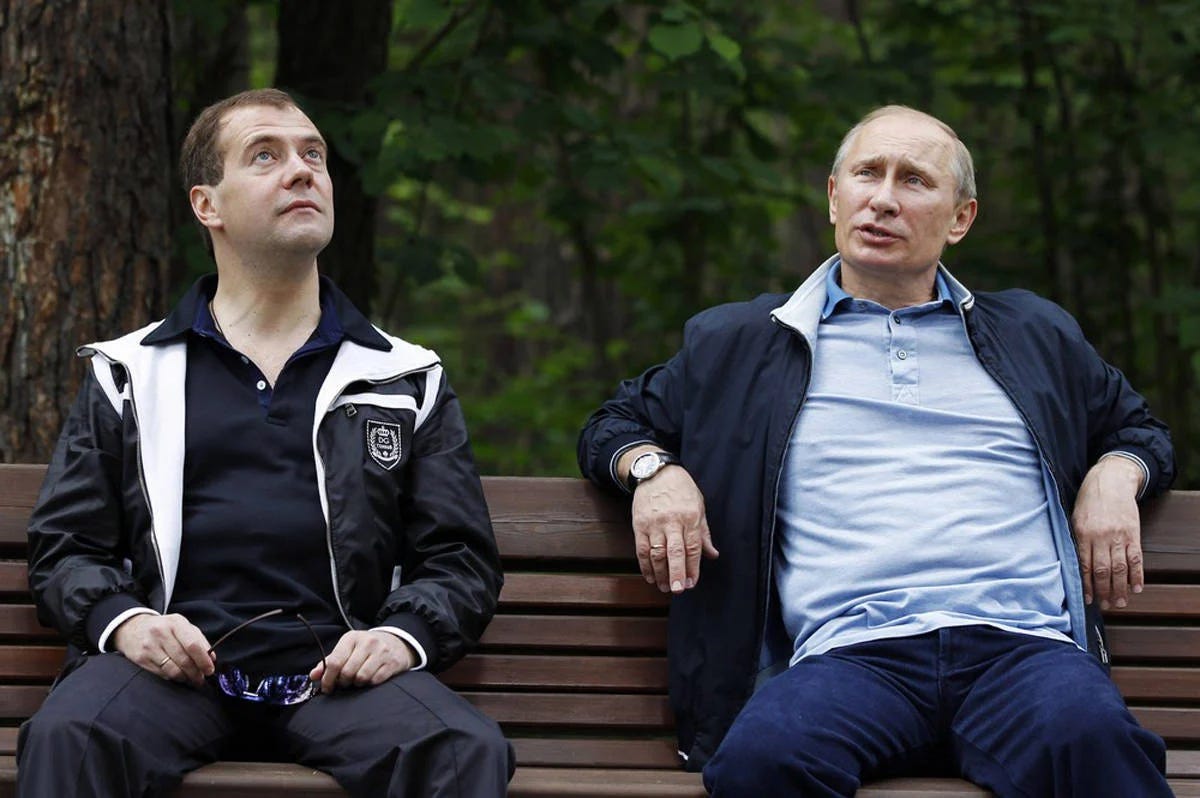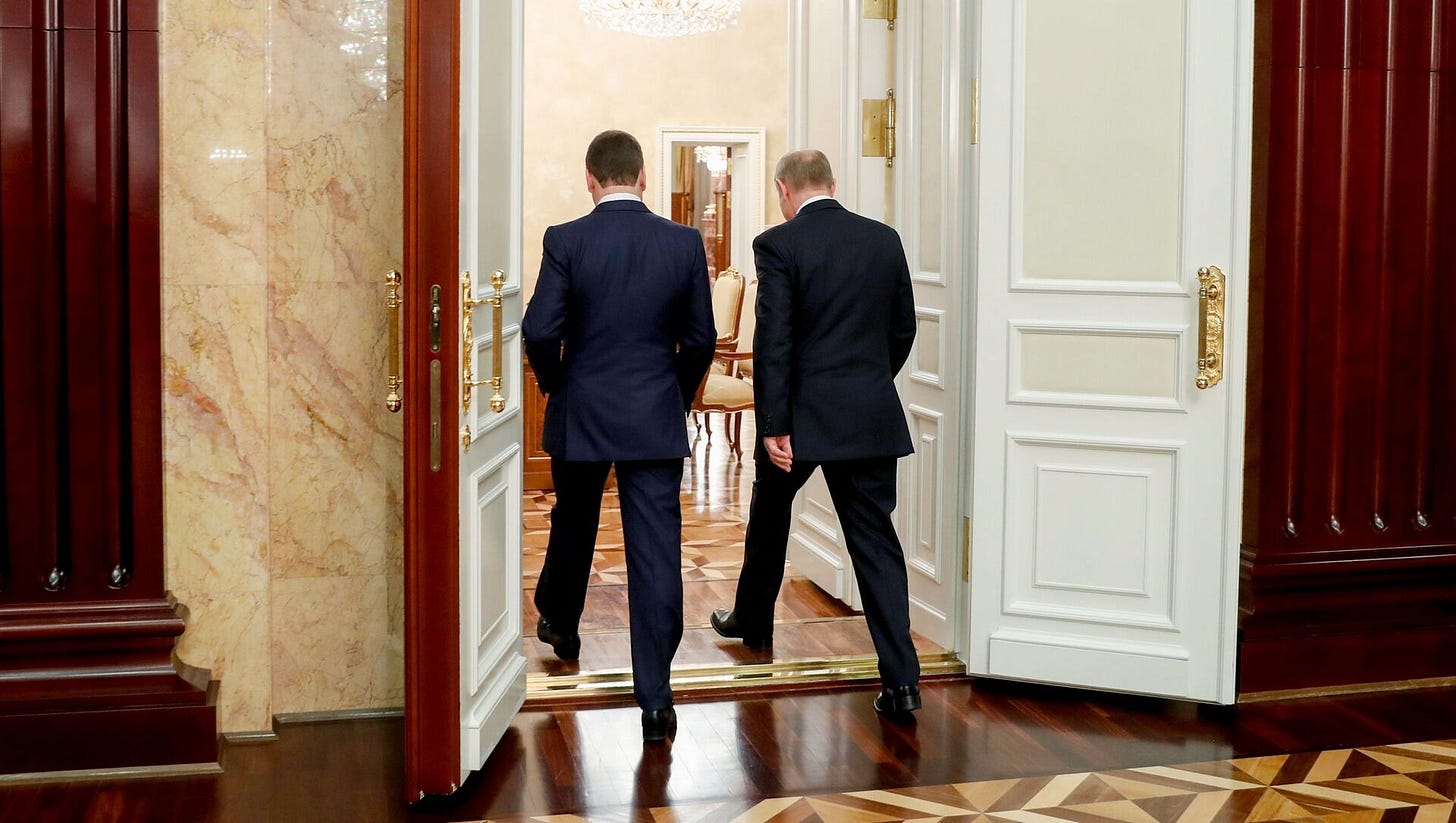A few years ago, everyone believed that Dmitry Medvedev, the former president of Russia, had faded into history and would never become an influential politician again. But, like in a Hollywood horror movie, he has returned – as a werewolf. Completely unlike his former self, he now appears to be the exact opposite. Strangely enough, this dreadful transformation has regained him his political standing. He is once again one of the most important politicians in Russia.
“The rotten liver sausage Scholz suddenly started rambling nonsense. Or, as we would say in a well-known language around here, he totally lost his bearings… So where's the strength, you, sausage maker? Shame. That shithead should just get on his knees and beg for forgiveness”…
This is not the rant of a thug from a rough neighborhood; it is a recent official statement from the Deputy Chairman of the Russian Security Council – and he’s speaking about German Chancellor. Moreover, he is not just using foul language but also making threats. Last week, he told the state news agency TASS that Russia could launch a nuclear strike on European territory. "Unfortunately, this is not intimidation or nuclear bluffing. The current military conflict with the West is unfolding according to the worst-case scenario. There is a constant escalation of the power of NATO weapons being used. Therefore, no one can rule out the conflict escalating to its final stage today."
What happened? The former president, a liberal, a gadget and high-tech enthusiast, a friend of Barack Obama, who once seemed to be Russia's hope for democratic development. Suddenly, like in a bad movie, he turned into one of the most bloodthirsty bullies, using thug language to threaten Ukraine and the entire world. What happened to Medvedev? In reality, this is not a prolonged bender, and the former president is not a hostage – it is a calculated political maneuver. Today's Russia demands such transformations and nothing less.
Puppet Becoming A Real Boy
I saw Dmitry Medvedev several times. For example, in 2010, when my colleagues and I were creating the TV channel "Dozhd" (TVRain), the only independent news channel in Russia, Medvedev was the president. During those years, he spoke many wonderful words. For instance, he stated that "freedom is better than non-freedom" (it sounded banal, but everyone understood who Medvedev meant by "non-freedom," implying that he would bring freedom). He also called on the security agencies to "stop terrorizing businesses." This almost seemed like a revolution – and a revolution against Putin at that.
Most opposition figures and independent journalists were very cautious about Medvedev. Many said he was just a puppet, a toy in Putin's hands, and his role was to sit in the presidential chair for four years and return it to Putin intact. Evidently, Putin thought so too.
But there were those who believed that Medvedev was a chance. I remember very well a conversation with Lyudmila Alexeyeva, the legendary Soviet human rights activist and long-time leader of the Moscow Helsinki Group. She said that everything possible should be done to bring Medvedev to our side. He shouldn't be humiliated – on the contrary, we should try to support him. His words about freedom were a good start, and maybe he would go from words to deeds, and perhaps even dare to dismiss Putin. Indeed, Putin's fate was in Medvedev's hands for those four years – as president, he could have dismissed his predecessor from the post of prime minister at any moment.
And indeed, Medvedev sometimes appeared to be a decent person. Other government officials tried to destroy the "Dozhd" channel right from the start, while Medvedev, on the contrary, decided to support it. He even came to the young channel's studio to give an interview to independent journalists.
Medvedev sometimes behaved not as Putin's protégé but as a guerrilla sent into enemy territory, trying to carry out as many diversions as possible before being discovered. He introduced dozens of highly liberal laws to the Duma. For example, he secured the adoption of a law requiring officials to declare their income – a rule that still stands. He attempted to start a humanization of the prison system. He began police reform. Most of these laws were sabotaged by the system or were repealed after his departure.
Medvedev tried to be friends with Barack Obama. He insisted that Russia join the sanctions against Iran and supported the operation in Libya. It was clear that it was important to him that Russia be part of the "civilized world."
But, to be fair, Medvedev did not always look like an independent liberal politician. Very often, he looked like Putin's puppet that occasionally started to come to life – with short circuits and system failures causing human emotions to suddenly appear in the lifeless doll. But most of the time, it did not deviate from the program and worked exactly as the master intended.
Liberal Becoming Conservative
The drama unfolded in 2011. Influenced by his own circle, businesses that didn't want Putin to return to power, and the few liberals who dared to support him, President Medvedev briefly grew bold. He imagined running for a second presidential term, reforming the country in his own way, and possibly dismissing Putin. This momentary lapse of reason didn’t last long – and Putin noticed it.
No one knows exactly what leverage Putin used, but the details of their historic conversation are well-documented, as I first described in my book All The Kremlin’s Men. In August 2011, while fishing in Astrakhan, Putin, shocked by the Arab Spring, the overthrow of Gaddafi, and the trial of Mubarak, told Medvedev, "The situation is difficult, Dima, we could lose the country." And "Dima" Medvedev agreed. He didn't argue – after all, only Putin could "save" the country. Moreover, according to my sources, in that conversation, Putin allegedly promised Medvedev that their role swap was temporary, implying Medvedev could return to the presidency.
On September 24, 2011, at the congress of the ruling United Russia party, Medvedev announced he would not run for a second term, and instead, Putin would run for a third.
This was followed by massive protests across the country against Putin’s return. Medvedev's entourage somehow decided that these rallies were in his support. But the most frightening part was that Putin believed this too. The conservative faction in Putin’s circle accused "Medvedev's liberals" of being traitors, planning a "Russian Maidan" funded by the U.S. State Department. Although everyone knew this was nonsense, Medvedev's reputation in the eyes of the boss was damaged.
After stepping down in 2012, Medvedev, in accordance with his agreement with Putin, was appointed Prime Minister of Russia and made a point of not interfering in anything, staying demonstratively aloof from all issues, to avoid incurring the wrath of the master.
Even after his resignation as president, Medvedev occasionally interacted with independent journalists – the last time I interviewed him was in 2014. One of the questions I asked was: "Did you completely change your beliefs or were you never a liberal?" He dodged the question, recalling a quote attributed to British Prime Minister Disraeli: "A man who is not a liberal when he is young, has no heart; a man who is not a conservative when old has no brain."
As Prime Minister, Medvedev indeed appeared to be a completely different person. There were rumors that he drank heavily.
Even as president, Medvedev was always the subject of ridicule – his nickname on the internet became "pathetic." Videos of him dancing awkwardly or photos showing him sleeping at all major events, including the opening and closing ceremonies of the Olympic Games, were widely circulated. But the universal contempt was not the worst of it.
Then came the criminal cases. Entrepreneurs or officials who rose to prominence under Medvedev or seemed close to him lost their businesses and positions. In May 2018, businessman Ziyavudin Magomedov, called Medvedev's "wallet," and his brother were arrested. (In 2022, they were sentenced to 19 and 18 years in prison, respectively). And in March 2019, former minister and billionaire Mikhail Abyzov, who was close to Medvedev, was arrested. (In 2023, he was sentenced to 12 years in prison). All of these individuals were part of the former president's inner circle, and their criminal cases indicated that Medvedev's influence on Putin was not just zero, but negative.
Pathetic Becoming Terrible
In January 2020, Putin unexpectedly dismissed Medvedev from the post of prime minister, creating for him the previously nonexistent position of "Deputy Chairman of the Security Council." No one knew at the time that a month later, COVID-19 would strike, making this dismissal the best possible gift. Moreover, everyone thought Medvedev had faded into history forever.
But the war suddenly woke him from his eternal slumber. The "pathetic" Medvedev suddenly transformed into the "terrible" one. His previously mild-mannered Telegram channel became a platform for monstrous rudeness.
In June 2022, Medvedev published the following post: "People often ask me why my posts on Telegram are so harsh. My answer is – I hate them [Westerners]. They are bastards and degenerates. They want us, Russia, dead. And as long as I am alive, I will do everything to make them disappear."
According to sources close to the former president, of course, he does not write all these texts himself. With the onset of the war, a large staff of new consultants and speechwriters was hired for him, fueling a militaristic and imperialistic wave.
The creation of Medvedev's new image – not as a liberal but as a dark reactionary – is, as usual, tied to his hopes of regaining the presidency. He certainly remembers that conversation in Astrakhan in August 2011, while fishing. Putin promised him that Medvedev would be the next president again. So, there is a chance. At the beginning of 2022, according to sources, Putin once again hinted to Medvedev that the plan was still in place – he just needed to be a strong politician who fits the historical moment.
Coincidentally, at the very start of Russia’s full-scale invasion of Ukraine, Vladimir Zhirinovsky, the odious politician and grotesque ultranationalist who had participated in presidential and parliamentary elections since 1991 and consistently received a relatively high percentage of votes, died. For many years, he was considered a puppet used by Putin to introduce the most insane and aggressive ideas. With Zhirinovsky's death, this niche became vacant. According to one of my sources, Putin himself advised Medvedev to become the new Zhirinovsky if he wanted to be popular.
Hope Becoming Nightmare
Previously, Medvedev did exactly what he thought might bring him back to the presidential chair. As Prime Minister, he stayed quiet and unobtrusive, not bothering anyone, so as not to make new enemies or upset Putin. Now, the time for inaction has passed; he needs to be aggressive, rattle sabers, envision victory for himself, and rush to the forefront. This is a calculated move for a post-war future. Medvedev is not the only one in this race – rudeness and imperialism have already become the norm in Russian politics. But he is clearly trying harder than anyone else.
It is deeply ironic that the mouthpiece of today's Russian fascism is someone who was once considered a hope for democracy. "This is what your hopes have turned into," Putin seems to be saying to the Russian intelligentsia.
Surprisingly, this behavior has already borne fruit for Medvedev. He is no longer considered a laughingstock among Russian bureaucrats. He is part of the small circle of people who have regular access to Putin and meet with him frequently. Medvedev has the authority to regularly hold meetings with high-ranking security officials.
Due to the fact that in 2020 a previously nonexistent position – Deputy Chairman of the Security Council – was created for Medvedev, he found himself involved in a bureaucratic conflict with Nikolai Patrushev, the Secretary of the same Security Council. They competed over who would command the apparatus. It seemed that the former FSB director Patrushev, a significant figure and the curator of all security officials, as well as the ideologue of Russian anti-Americanism, would prevail. However, in May of this year, Putin removed Patrushev from the Security Council and assigned him the meaningless position of "advisor on shipbuilding." This means that Medvedev won – and his role continues to grow.
Should we take his threats of nuclear war seriously? Probably not, but he is a good indicator of what is considered extreme yet permissible in Moscow. Judging by his current rhetoric, the Putin elite revels in the sense that everyone around them is weak and frightened – hence his gleeful threats. Putin believes he can afford a new escalation – and Medvedev is the one announcing it.











